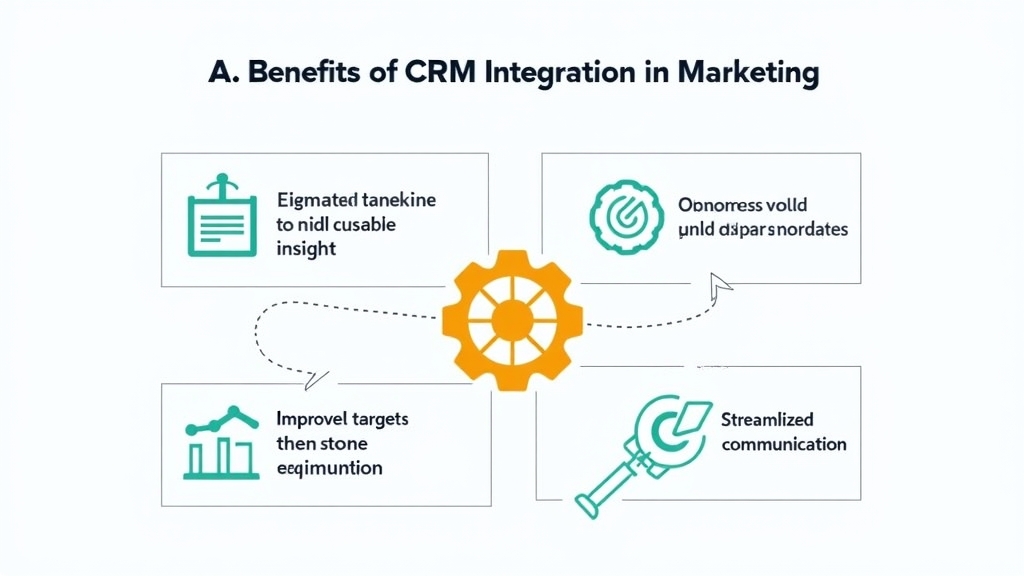Marketing – CRM Integration for Marketing: Unlocking New Opportunities
Introduction
In today’s fast-paced business world, integrating Customer Relationship Management (CRM) systems with marketing strategies is essential. This integration helps businesses understand their customers better and tailor their marketing efforts accordingly. By combining data from various sources, you can create a more personalized experience for your audience. In this article, we will explore the importance of CRM integration in marketing and how it can unlock new opportunities for your business.
Understanding CRM Integration in Marketing
CRM integration in marketing refers to connecting your CRM system with various marketing tools and platforms. This connection allows you to gather valuable customer data, track interactions, and analyze trends effectively. With integrated systems, you can streamline processes and enhance communication between sales and marketing teams.
The importance of integrating CRM with marketing strategies cannot be overstated. It enables businesses to leverage customer insights to craft targeted campaigns that resonate with their audience. By understanding customer behavior and preferences, you can improve engagement rates and drive conversions.
Benefits of CRM Integration for Marketing
Enhanced Customer Insights
One of the primary benefits of CRM integration is enhanced customer insights. By collecting data from multiple touchpoints—such as social media interactions, email responses, and website visits—you gain a comprehensive view of your customers’ behaviors and preferences. This information allows you to create more effective marketing strategies tailored to individual needs.
Improved Targeting and Segmentation
With better insights comes improved targeting and segmentation capabilities. You can categorize customers based on demographics, purchase history, or engagement levels. This segmentation helps ensure that your marketing messages reach the right people at the right time, increasing the likelihood of conversion.
Streamlined Communication
Integrating your CRM with marketing tools also streamlines communication within your organization. Sales teams can access up-to-date information about leads generated through marketing campaigns. This alignment fosters collaboration between departments, ensuring everyone works towards common goals.
Key Features of Effective CRM Integration
Data Synchronization
Data synchronization is crucial for effective CRM integration in marketing. It ensures that all customer information is consistent across platforms—eliminating discrepancies that could lead to confusion or miscommunication.
Automation of Marketing Campaigns
Automation features allow marketers to set up campaigns that run without constant oversight. For example, when a lead fills out a form on your website, an automated email series can begin immediately—nurturing them until they are ready to make a purchase.
Reporting and Analytics Tools
Effective reporting tools help measure campaign performance by analyzing key metrics such as open rates or click-through rates. These analytics provide insight into what works well—and what doesn’t—allowing for continuous improvement in future campaigns.
Choosing the Right CRM for Marketing Integration
Factors to Consider When Selecting a CRM
When selecting a CRM for marketing integration, consider factors like ease of use, scalability, compatibility with existing tools, and cost-effectiveness. A user-friendly interface will encourage team adoption while scalability ensures it grows alongside your business needs.
Popular CRMs that Excel in Marketing Integration
- Salesforce: Known for its robust features.
- HubSpot: Offers excellent inbound marketing capabilities.
- Zoho: Provides affordable options without sacrificing functionality.
These platforms have proven successful at helping businesses integrate their sales processes seamlessly with their marketing efforts.
Best Practices for Successful CRM Integration in Marketing
Aligning Teams and Objectives
For successful integration, align both sales and marketing teams around shared objectives. Regular meetings foster collaboration while ensuring everyone understands how their roles contribute toward achieving common goals.
Training Staff on CRM Use
Investing time into training staff on using the chosen system maximizes its potential benefits; knowledgeable employees will utilize features effectively rather than relying solely on trial-and-error methods which may lead them astray!
Continuous Monitoring and Optimization
After implementing an integrated system monitor its performance regularly! Collect feedback from users regarding usability issues & identify areas requiring optimization so improvements happen proactively instead waiting until problems arise later down road!
Case Studies: Successful CRM Integration in Marketing
Brand A: Transforming Customer Engagement
Brand A successfully integrated its Salesforce platform with email automation software resulting in increased engagement rates by 30%. The seamless flow allowed them not only track interactions but also personalize content based upon user behavior leading ultimately higher satisfaction levels among clients!
Brand B: Boosting Sales through Data-Driven Decisions
Brand B utilized HubSpot’s analytics tools after integrating them into operations; they analyzed past campaign performances identifying trends which led directly boosting sales figures by 25% over six months! Their ability leverage actionable insights made all difference here!
Future Trends in CRM Integration for Marketing
AI and Machine Learning in CRM Systems
Artificial Intelligence (AI) continues playing larger role within CRMs enhancing predictive analytics capabilities enabling marketers anticipate consumer behavior before it happens! Machine learning algorithms refine targeting methods further optimizing outreach efforts overall effectiveness too!
The Rise of Omnichannel Strategies
As consumers interact across multiple channels simultaneously omnichannel strategies become increasingly important! Integrating CRMs allows brands maintain consistent messaging regardless where customers engage whether online via social media offline during events etc., creating unified experiences throughout journey!
Conclusion
Integrating a robust Customer Relationship Management (CRM) system into modern-day market practices offers numerous advantages—from enhanced insights leading improved targeting streamlined communications—all contributing positively towards maximizing impact achieved through effective strategies employed today! Embracing these integrations positions businesses favorably against competitors who may still operate traditional silos lacking synergy necessary thrive marketplace evolving rapidly around us now!
📢 Explore More: Continue Your Journey!
If this article helped you understand how important it is to integrate CRMs into your business strategy effectively check out How Automation Transforms Your Business Operations! It covers powerful insights helping you grasp how automation enhances efficiency across various sectors seamlessly.














![NEEWER 55W 18"/45cm Ring Light Kit [New Version], 5600K Dimmable ...](https://m.media-amazon.com/images/I/414QLqvZWLL._AC_.jpg)








